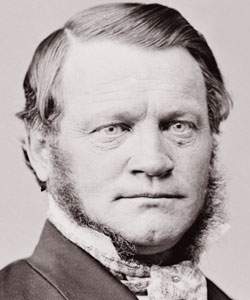Josiah Bushnell Grinnell (American National Biography)
Scholarship
In 1856 he helped organize the Republican party in Iowa. At the convention in Iowa City, Grinnell was instrumental in "the delicate task" of bringing together abolitionists, temperance advocates, Know Nothings, and former Whigs. He won election to the state senate in 1856 and 1858 on the platform of temperance, free public education for all, and free soil. He tirelessly argued that not only were such positions morally correct, but they would bring prosperity by increasing the value of labor and the land. Despite securing a public school law, the creation of an agricultural college at Ames, and a temperance law, he was not renominated for a third term. His reputation might have been injured in February 1859, when he entertained and assisted John Brown and several fugitive slaves. Grinnell was a delegate to the 1860 Republican National Convention and became a devoted supporter of Abraham Lincoln. From 1861 to 1863 Grinnell was a special agent of the Post Office Department, giving him ample opportunity "to fan the fires of patriotism" and encourage army enlistments (Grinnell, p. 124).
With some difficulty, Grinnell was nominated for Congress from Iowa's Fifth District in 1862 and, thanks to a substantial soldiers' vote, won the election. He was reelected by a more comfortable margin in 1864. Grinnell could be counted among the Radical Republicans in favor of a vigorous prosecution of the war, the enlistment of blacks, and Radical Reconstruction measures. Years later he regretted not punishing the South further by insisting on "a territorial probation before admission" (Grinnell, p. 158).
With some difficulty, Grinnell was nominated for Congress from Iowa's Fifth District in 1862 and, thanks to a substantial soldiers' vote, won the election. He was reelected by a more comfortable margin in 1864. Grinnell could be counted among the Radical Republicans in favor of a vigorous prosecution of the war, the enlistment of blacks, and Radical Reconstruction measures. Years later he regretted not punishing the South further by insisting on "a territorial probation before admission" (Grinnell, p. 158).
M. Philip Lucas, "Grinnell, Josiah Bushnell," American National Biography Online, February 2000, http://www.anb.org/articles/04/04-00440.html.
Josiah Bushnell Grinnell (Congressional Biographical Directory)
Reference
GRINNELL, Josiah Bushnell, a Representative from Iowa; born in New Haven, Addison County, Vt., December 22, 1821; attended the common schools and Oneida Institute; pursued classical studies; was graduated from Auburn Theological Seminary in 1847; ordained a Presbyterian clergyman; held pastorates in Union Village, N.Y., Washington, D.C., and in the Congregational Church of New York City; moved to Iowa in 1854 and founded the town of Grinnell, Poweshiek County, and also Grinnell University; member of the State senate 1856-1860; studied law; was admitted to the bar in 1858 and practiced; delegate to the Republican National Convention in 1860; special agent for the Post Office Department for two years; elected as a Republican to the Thirty-eighth and Thirty-ninth Congresses (March 4, 1863-March 3, 1867); was not a candidate for renomination in 1866; resumed the practice of law; interested in building of railroads; director of the Rock Island Railroad; receiver of the Iowa Central Railroad (later the St. Louis & St. Paul Railroad); president of the State Horticultural Society and of the First National Bank in Grinnell; died in Grinnell, Iowa, March 31, 1891; interment in Hazelwood Cemetery.
"Grinnell, Josiah Bushnell," Biographical Directory of the United States Congress, 1774 to Present, http://bioguide.congress.gov/scripts/biodisplay.pl?index=G000478.



